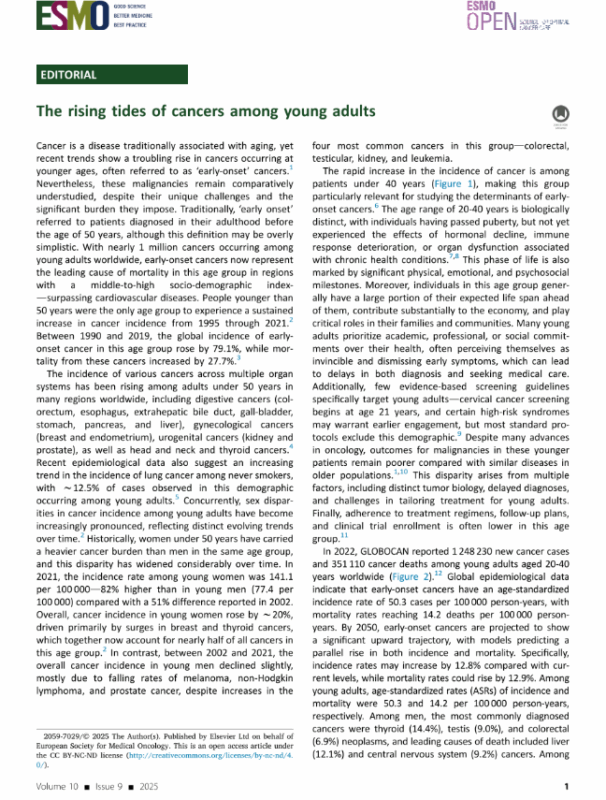Olubukola Ayodele, Breast Cancer Lead at University Hospitals of Leicester NHS Trust, shared on LinkedIn:
“When my patient aged 27, first noticed worrying symptoms, cancer wasn’t on her mind. She was young, busy, and “too healthy” for such a diagnosis. By the time she sought help, her disease was advanced.
Her story is becoming alarmingly common. Cancer is no longer just a disease of ageing.
A new ESMO Open editorial highlights a worrying reality: cancers in young adults (under 50) are rising sharply across the globe. Between 1990 and 2019, the incidence of early-onset cancers increased by 79%, with mortality climbing by 28%. In 2022 alone, over 1.2 million new cases and 350,000 deaths were reported worldwide in people aged 20–40 .
In many regions, cancer has now overtaken cardiovascular disease as the leading cause of death in young adults. Breast, colorectal, thyroid, cervical, and gastrointestinal cancers are driving much of this trend. Strikingly, young women are disproportionately affected. In 2021 their cancer incidence was 82% higher than in men of the same age group.
Global and UK relevance
This is not just a global issue. In the UK, we are seeing similar increases, particularly in breast and colorectal cancer in younger people. Yet, most screening programmes and public health strategies remain geared towards older adults. The result? Many young patients present late, with more advanced disease, and experience poorer outcomes.
Why does this matter?
Young adulthood is a critical life stage: education, career, family planning. A cancer diagnosis here not only threatens life expectancy but also impacts fertility, finances, and long-term psychosocial wellbeing. This generation is also essential to economic and community stability making this rising burden a wider societal issue.
What can we do?
– Public awareness: Challenge the perception that cancer is a disease of “old age.” Encourage young adults not to ignore persistent symptoms.
– Health system response: Adapt referral pathways to consider cancer in differential diagnoses for younger people; integrate risk assessment tools that flag those at higher risk.
– Clinical practice: Increase inclusion of young adults in clinical trials. Address their unique needs such as fertility preservation, tailored survivorship care and mental health support.
– Research and policy: Prioritise studying the causes of early-onset cancers; from lifestyle and environment to genetics and microbiome changes. Build prevention and early detection strategies accordingly.
The message is clear: cancer in young adults is not rare, it is rising, and it demands urgent attention. Tackling it will require joint efforts between policymakers, researchers, clinicians, and the public.”

More posts featuring Olubukola Ayodele on OncoDaily.


